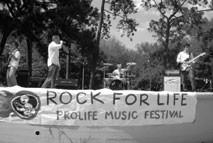The pro-life movement spread its message through song and speech on Saturday at the Greek Amphitheater.
The University organization Students for Life sponsored a six-hour concert, Rock for Life, featuring Christian bands and speakers who promoted a pro-life outlook on euthanasia, capital punishment and abortion. Jansen Rothman, a sociology junior and the organization’s president, said that donations are sent to a pregnancy crisis center.
Students for Life has been on campus since 2001, and they have sponsored the concert for three years. Local bands Pound of Pure, Dismas and Three Day Journey played, and solo artists Laura Heintz and Pete Dawson also performed.
“The concert gets people to come out and listen to music, talk about issues and answer questions,” Rothman said.
Rothman said that Students for Life is a pro-life organization dedicated to informing students about respecting life in general.
Samuel Vasquez with the governor’s program on abstinence spoke at Rock for Life. A spokesperson from “Project Rachel,” an organization that helps women cope with abortion, also spoke at the concert.
The speakers’ message brings the reality of the pro-life movement, Students for Life member Steven Hebert said. They focused on facts not normally emphasized in the news.
Hebert said that he learned about the hardship, physical and psychological, that women experience when dealing with abortion.
“I want to share the statistics, like the 4,400 babies killed every day in America, with the high school youth group I work with,” Hebert said. “Learning more about the pro-life movement gave me a sense of responsibility to talk to others about the issues.”
Mareike Massow, a mathematics graduate student, said that she liked how the bands expressed their Christian faith through their music.
Massow, a German exchange student, said that although most European countries have abolished the death penalty, abortion is a separate issue from the death penalty.
“There are much less people against abortion,” Massow said.
Massow said that European women view a woman’s right to choose as an accomplishment gained through a cultural revolution in the 1960s.
“Women have claimed more rights,” Massow said. “I am not speaking for all of Europe, but many feel this way.”
Steve Caruso, a junior in Spanish, said that his personal view of the pro-life movement changed after Rock for Life.
“I learned that the pro-life movement could and hopefully would be very popular,” Caruso said. “I think that it is only effective by personal invitation, because it’s not something that people come to on their own. It takes a lot of commitment.”
Caruso said that the pro-life movement is not about “fanatical movements raiding abortion clinics,” but it is about “loving people.”
“There are many people who support the pro-life movement in word but don’t know what to do when they need to act on their beliefs,” Caruso said. “They don’t know what to do when the situation comes up, and they are indifferent in their actions.”
Hebert said that Rock for Life was a success because the music drew people to the event, and then the speakers delivered their messages of pro-life.
“The event did not have a preachy approach, it focused on reality,” Hebert said.
Rock for Life concert sends pro-life message
April 21, 2004

Rock for Life concert sends pro-life message





